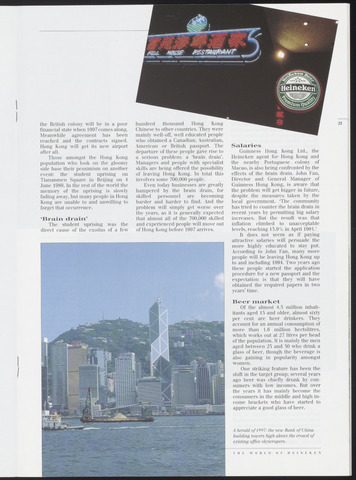I
I
I
the British colony will be in a poor
financial state when 1997 comes along.
Meanwhile agreement has been
reached and the contracts signed.
Hong Kong will get its new airport
after all.
Those amongst the Hong Kong
population who look on the gloomy
side base their pessimism on another
event: the student uprising on
Tiananmen Square in Beijing on 4
June 1989. In the rest of the world the
memory of the uprising is slowly
fading away, but many people in Hong
Kong are unable to and unwilling to
forget that occurrence.
'Brain drain'
The student uprising was the
direct cause of the exodus of a few
hundred thousand Hong Kong
Chinese to other countries. They were
mainly well-off, well educated people
who obtained a Canadian, Australian,
American or British passport. The
departure of these people gave rise to
a serious problem: a 'brain drain'.
Managers and people with specialist
skills are being offered the possibility
of leaving Hong Kong. In total this
involves some 700,000 people.
Even today businesses are greatly
hampered by the brain drain, for
skilled personnel are becoming
harder and harder to find. And the
problem will simply get worse over
the years, as it is generally expected
that almost all of the 700,000 skilled
and experienced people will move out
of Hong Kong before 1997 arrives.
Salaries
Guinness Hong Kong Ltd., the
Heineken agent for Hong Kong and
the nearby Portuguese colony of
Macao, is also being confronted by the
effects of the brain drain. John Fan,
Director and General Manager of
Guinness Hong Kong, is aware that
the problem will get bigger in future,
despite the measures taken by the
local government. 'The community
has tried to counter the brain drain in
recent years by permitting big salary
increases. But the result was that
inflation climbed to unacceptable
levels, reaching 13.9% in April 1991.'
It does not seem as if paying
attractive salaries will persuade the
more highly educated to stay put.
According to John Fan, many more
people will be leaving Hong Kong up
to and including 1994. Two years ago
these people started the application
procedure for a new passport and the
expectation is that they will have
obtained the required papers in two
years' time.
Beer market
Of the almost 4.5 million inhab
itants aged 15 and older, almost sixty
per cent are beer drinkers. They
account for an annual consumption of
more than 1.6 million hectolitres,
which works out at 27 litres per head
of the population. It is mainly the men
aged between 25 and 50 who drink a
glass of beer, though the beverage is
also gaining in popularity amongst
women.
One striking feature has been the
shift in the target group; several years
ago beer was chiefly drunk by con
sumers with low incomes. But over
the years it has mainly become the
consumers in the middle and high in
come brackets who have started to
appreciate a good glass of beer.
A herald of 1997: the new Bank of China
building towers high above the crowd of
existing office skyscrapers.

